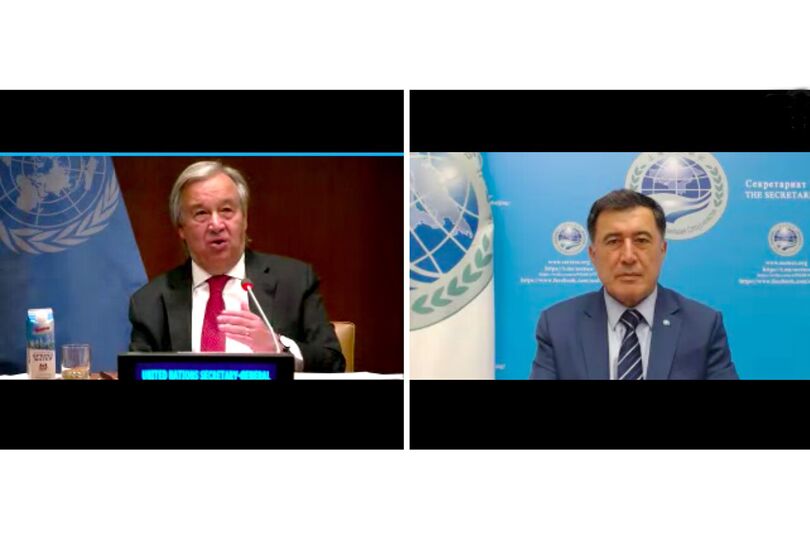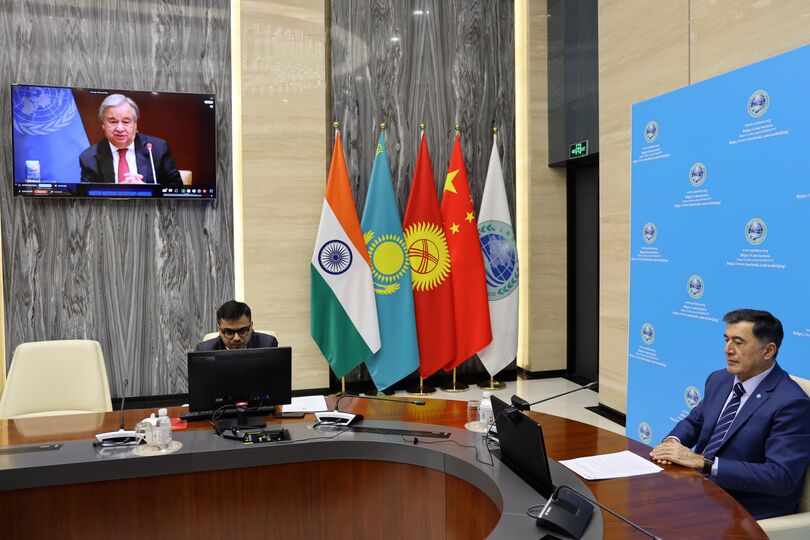On 23 November 2020, SCO Secretary-General Vladimir Norov took part in a high-level interactive dialogue of heads of regional and other organisations with UN Secretary-General Antonio Guterres.
This year the meeting focused on the fight against the COVID-19 pandemic, regional initiatives on strengthening coordination and global governance in the area of peace and security, as well as joint actions against the current and future challenges.
The SCO Secretary-General pointed out that the pandemic, which hit the world in the year of the 75th anniversary of the UN and Victory in World War II, had a negative impact on the traditional multilateral political contacts.
He noted that in this situation the SCO proved its viability as a transregional platform and a reliable partner for the UN in the fight against epidemiological, political and socioeconomic challenges.
Vladimir Norov spoke highly about the UN Secretary-General's leading role in consolidating international efforts against the coronavirus pandemic.
He pointed out that following their summit meeting in Moscow the SCO member states called for rallying inclusive UN-led international efforts to reinforce the world's healthcare system, primarily the WHO potential.
Vladimir Norov warned against politicisation of the pandemic and advocated a consistent stand in favour of global solidarity and mutually beneficial cooperation.
He added that in the almost 20 years since its establishment the Shanghai Cooperation Organisation had become an influential and responsible member of the current system of international relations resolved to continue increasing its contribution to peace and security, and the settlement of international and regional conflicts exclusively by political and diplomatic means.
The SCO Secretary-General pointed out that the Moscow Declaration sealed the member states' resolve to promote the development of a more representative and fair international order based on the primacy of international law, first of all the UN Charter, respect for civilisational diversity and a free choice of political and socioeconomic development paths, equal partnership of states in the interests of equal, indivisible, comprehensive and sustainable security, as well as the implementation of the 2030 Agenda for Sustainable Development.
Vladimir Norov emphasised the importance of supporting the efforts of the UN as a universal multilateral organisation, which is playing the central coordinating role in maintaining international peace and security, stimulating global development, and promoting and protecting human rights.
He expressed concern that the ongoing in-depth transformation of international relations connected with the development of a multipolar world faced increasing challenges and threats to international security and the current system of interstate relations based on respect for and compliance with universally recognised norms of international law.
He mentioned the risks of political bias in international economic relations for the sustainable development of the global economy.
In this context, Vladimir Norov pointed out that the SCO countries were resolved to continue improving the architecture of global economic governance and that they would consistently uphold and strengthen an open, transparent, fair, inclusive and non-discriminatory multilateral system of trade based on WTO principles and rules.
In his response, UN Secretary-General Antonio Guterres noted that the SCO represented the interests of a considerable part of humanity, which increased after India and Pakistan joined the organisation.
Antonio Guterres mentioned the importance of Vladimir Norov's call for pursuing a common policy in the fields of security and trade based on the universally recognised norms and principles of international law.
The UN Secretary-General also praised the SCO member states' contribution to a peaceful settlement in Afghanistan.

Taking part in the event were senior officials from the leading regional organisations, such as the African Union (AU), the Association of Southeast Asian Nations (ASEAN), the Caribbean Community (CARICOM), the Collective Security Treaty Organisation (CSTO), the Commonwealth of Independent States (CIS), the Community of Portuguese Language Countries (CPLP), the Cooperation Council for the Arab States of the Gulf (GCC), the East African Community (EAC), the Economic Community of West African States (ECOWAS), the European Union (EU), the Iberoamerican Community of Nations, the Intergovernmental Authority on Development (IGAD), the League of Arab States (LAS), the North Atlantic Treaty Organisation (NATO), the Organization for Security and Cooperation in Europe (OSCE), the Organisation of American States (OAS), the Organisation of Islamic Cooperation (OIC), Organisation Internationale de la Francophonie (OIF), the South Asian Association for Regional Cooperation (SAARC), and the Southern African Development Community (SADC).
